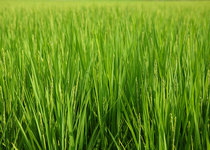Global rice production at risk from climate change
A new study has warned that the continual increase of global temperatures could hinder rice crop production.

 A new study released by an international team of scientists has warned that the continued increase of global temperatures caused by climate change could prove disastrous for the production of rice crops.
A new study released by an international team of scientists has warned that the continued increase of global temperatures caused by climate change could prove disastrous for the production of rice crops.
Rice is one of the world's most important crops with around 3 billion people eating it every day and more than 60 percent of the world's one billion poorest and undernourished people living in Asia depending on it as their staple food source.
Researchers have now found that the gradual increase of global temperatures is having the effect of slowing the growth of rice production in Asia. It is reported that several locations have experienced a 10 percent cut in yield growth rate due to rising temperatures over the last 25 years.
The report which was published in the Proceedings of the National Academy of Sciences (PNAS) utilises six years of data from 227 irrigated rice farms in six major rice-growing countries in Asia – producing more than 90 percent of the world's rice.
The results show that as nights grow hotter, an anticipated side-effect of climate change, rice yields will drop in productivity. Jarrod Welch the lead author of the report stated, "We found that as the daily minimum temperature increases, or as nights get hotter, rice yields drop."
The study is unique in that it is the first of its kind to assess the impact of both daily maximum and minimum temperatures on irrigated rice production in farmer-managed rice fields in tropical and sup-tropical regions of Asia.
Rather than being carried out in a controlled setting, the researchers collected data in real farmers' fields and thus take into account the possibility that farmers may adapt to changing conditions. Mr Welch said, "This is an important addition to what we already know from controlled experiments."
While up to a certain point daytime temperatures can actually increase rice crop productivity, the losses caused by higher night-time temperatures will likely undermine these increases as temperatures are actually rising faster at night.
Mr Welch added "And if day-time temperatures get too high, they too start to restrict rice yields, causing an additional loss in production."
The research warns that if there is no change in rice production methods and no development of new rice strains that are able to withstand the higher temperatures, there will be a noticeable decrease in the global production of rice crops. This is likely to get increasingly worse as temperatures continue to rise towards the year 2050.
In China, the production of 'hybrid rice' has long since been hailed as the cure for stagnating yields in the world's rice farms and hybrid rice programmes have been established across the world.
Hybrid rice has since become big business with Bangladesh, Pakistan as well as many South East Asian countries purchasing their crops predominantly from Beijing.
Vietnam is being considered a success story of hybrid rice production with the total cultivated area expected to reach 7.5 million hectares this year.
However, many farmers are now becoming disillusioned and critical of hybrid rice crops because of low yield, cost and susceptibility to pests. Many countries continue to plant hybrid crops simply because that is the only option.
Climate change and agriculture are interrelated processes, both of which take place on a global scale. Despite technological advances, weather still plays the greatest role in agricultural productivity.
Author: Tom Watts | Climate Action
Images: mrhayata | Flickr
